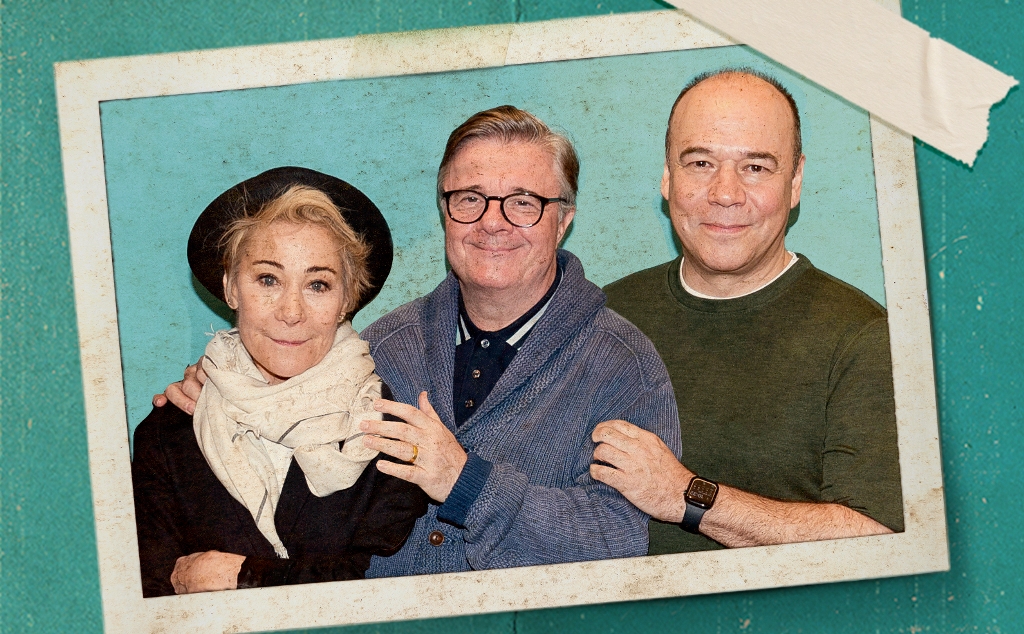PICTURES FROM HOME
by Sharr White
based on the photo memoir by Larry Sultan
Starring Nathan Lane, Danny Burstein and Zoë Wanamaker
Directed by Bartlet Sher
Studio 54
Official Website
Reviewed by David Spencer
Earlier this season, I saw, but was too over-extended to review, a play by Joseph Dougherty called Chester Bailey, at the Irish Rep, an extraordinary drama set during WWII about a psychiatrist and his patient: a non-military munitions worker who suffers traumatic injuries on the job, leaving him blind and having lost a hand which he maintains he still has.
I mention it here for two reasons.
The first—that is deserves notice, even transfer to an open-ended NY run and undoubtedly lots of regional attention.
The second—that I can’t say Pictures from Home by Sharr White strikes me as the best American play of the season so far without adding, alongside Chester Bailey.
I’ll say no more about the Chester Bailey. But it’s additionally relevant to my discussing Pictures From Home because Sharr White’s play likewise, albeit very differently, reolves around a main character’s sense that something is there even though it can’t be located.
The basis of Pictures from Home is an acclaimed 1992 pictorial memoir of the same title by Larry Sultan, in which the author-photographer tracks the relationship of his parents, with particular emphasis on his father—blending original photos with stills from home movies along with portrait and documentarian text that obliterates journalistic objectivity—in an effort to locate the out of frame realities, the even fuller story of his family; the story beyond not only public image, but private image and self-image.
In a production directed by Bartlet Sher that unabashedly uses photos from the book while its subjects are portrayed onstage by entirely different-looking people, Larry is played by Danny Burstrein, father Irving by Nathan Lane and mother Jean by Zoë Wanamaker.
What I think makes the play so worthy is that it is instantly engaging; that the family dynamics are utterly convincing, that the bond of love is authentic and that for all its seriousness of purpose, it is, even in many of its most touching and serious moments, funny. Flat-out, laff-out-loud, humanly funny. And evincing the kind of consistent laughter that used to be associated with Neil Simon. This is not easy to achieve.
Aiding and abetting getting it done is of course the cast. This is a trio who know exactly how to shade a line, time a pause, get the most mileage out of the smallest gesture. The play’s 105 minutes fly by without it seeming anywhere near that long.
Curiously, though, Pictures from Home is not a play without flaws—nor are the flaws minor:
Jean seems to get sidelined in the conflict between Larry and Irving.
Said conflict about the difference between an artist trying to find something intangible and a parent who has measured success in life by tangible benchmarks.
And that conflict is repetitive. Often it seems to be escalating in intensity but not really in content.
And that’s because Larry, in searching for something he can’t himself define, is a character with a nebulous objective.
As the project nears completion, there is some retroactive definition applied—ironically, it’s Irving who pulls that particular trigger—but it doesn’t change the fact that a main character spends the play fighting off the notion that he doesn’t know what he’s doing, psychologically, while trying to make the tools and perspectives of tradecraft fill in until he does know. It’s an abstraction that’s difficult to keep aloft.
But somehow, the alchemy of play, production and players manages the trick. (As I note elsewhere in this batch of reviews, The Wanderers, also about a Jewish family and crises of identity, tries to navigate similarly abstract objectives with similar retroactive revelations. If pressed to tell you why I think it works well enough in Pictures from Home and not so well in The Wanderers, I’d suggest that the use of photographs and—Larry’s dramatized application of technique—gives the abstractions sufficient enough substance that we can root for him. (To take this even a bit further: In The Wanderers, the latter-day husband is seeking escape from his ties to family. Sympathy for him is not impossible, but harder to maintain the further he goes.)
Also—and I guess we file this under “full disclosure”—my Dad, still, amazingly, with me, is 100 years old. And while my relationship with him is not a precise parallel of Larry’s with Irving, I sure clocked many points of identification. And that’s subjective.
But the audience reaction—its solidity, its clear dependability—made it apparent that I wasn’t in a select group, but only one in sync with a large community. And the effectiveness of a play doesn’t get more objective than that.
